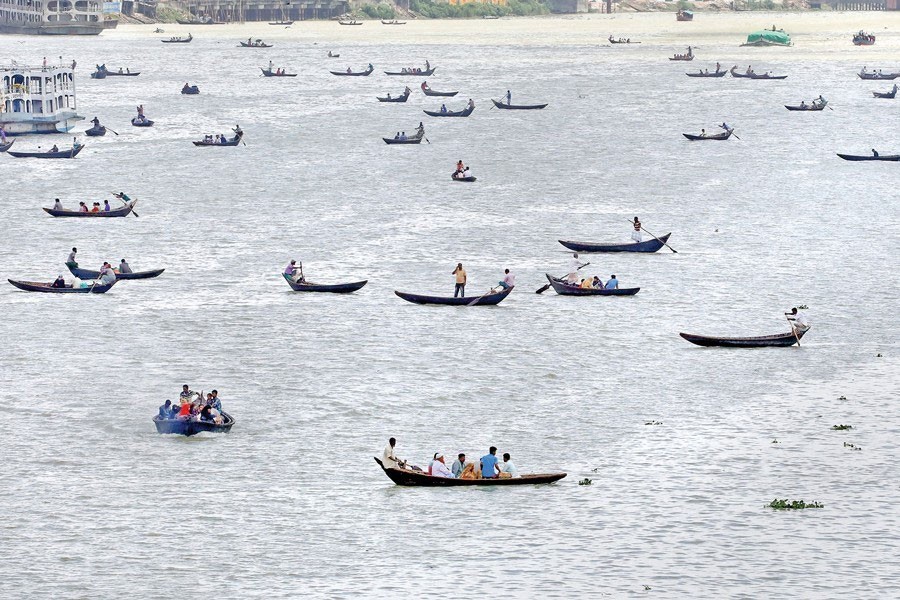With the monsoon, the Buriganga gets back some of its health. Even the naked eye can see that the water is no longer jet black like tar and does not emit foul smell now. This has been confirmed lately by a study carried out by the Centre for Atmospheric Pollution Studies of the Stamford University. The acidity of water is within the acceptable range and particles per million have also been tolerable. But in the channel of old Buriganga this is yet to come anywhere near the standard.
Be that what it may, the fact is that Buriganga is comparatively in a better health now since 2019. A combination of factors has made this possible. Rains this year have been plenty and this has been further helped by frequent and at times prolonged lockdowns. What it shows is that the Buriganga may still stand a chance of survival if proper measures are taken from now on. If the lockdowns have been of help, the massive eviction drive launched by the Bangladesh Inland Transport Authority (BIWTA) in which hundreds of illegal structures including polluting factories were knocked down has also proved beneficial. Further encroachment has been discouraged by this campaign for saving rivers in Bangladesh.
This has been an awakening on the part of a nation that has by now earned the infamy of what may be coined as 'rivericide' (killing of rivers). That rivers all across the country have been strangulated or encroached upon to turn them into mere canals or ditches is no secret. The authorities turned a blind eye to such cases even after environmental groups and rights bodies brought the issue to the former's notice. Had the river saving campaign received the attention it deserves, many rivers would not have died or been in their death throes.
The media have long been carrying pictorial reports on mindless encroachment of rivers all over Bangladesh. But when the lifeline of capital Dhaka itself suffers utter neglect, rivers elsewhere in the country stand hardly any chance of a redress. They will die unless some drastic measures are taken. An example has to be set by treating the Buriganga back to its health. Will the authority rise up to the challenge?
Ever since the High Court has declared rivers as 'living entity', there has been a change in the perception of these life-giving resources, albeit among a limited number of people. In a country where occupation and possession of land count as the ultimate consideration, even if the importance of rivers can change mentality of a few it is at least some gains.
It is unacceptable that the authorities have still failed to compel factories and industries not to release untreated waste into the Buriganga. There have been tall talks of turning the riverside into gardens or parks for people to enjoy the river's scenic beauty and fresh air. That may wait but before that let there be no compromise on releasing factory effluent and dumping of solid waste into the river water.
There are rivers that flow by --- or even bifurcate them --- some of the world's famous cities and capitals in France, Russia, the Netherlands. No one is allowed even to throw away even a small piece of paper into those rivers. The waters of those rivers are crystal clear. In some of those, birds have found a most ideal roaming place. They are not afraid of people who gather there in large numbers. In fact they are a treat to the eyes of all who come for loitering or an evening walk.
The Buriganga could be one such river but for the callousness of the people and the authorities. If its water can be left completely unpolluted, the Buriganga can still become a source of permanent joy. In that case the Sadarghat has to be removed preferably well beyond Postagola from its present location. If the river thus recovers its health, Dhaka city will also be a recipient of many of its benefits.

- Thursday, 21 November 2024 |
- Today's FE |
- e-Paper |
- Beta Website

